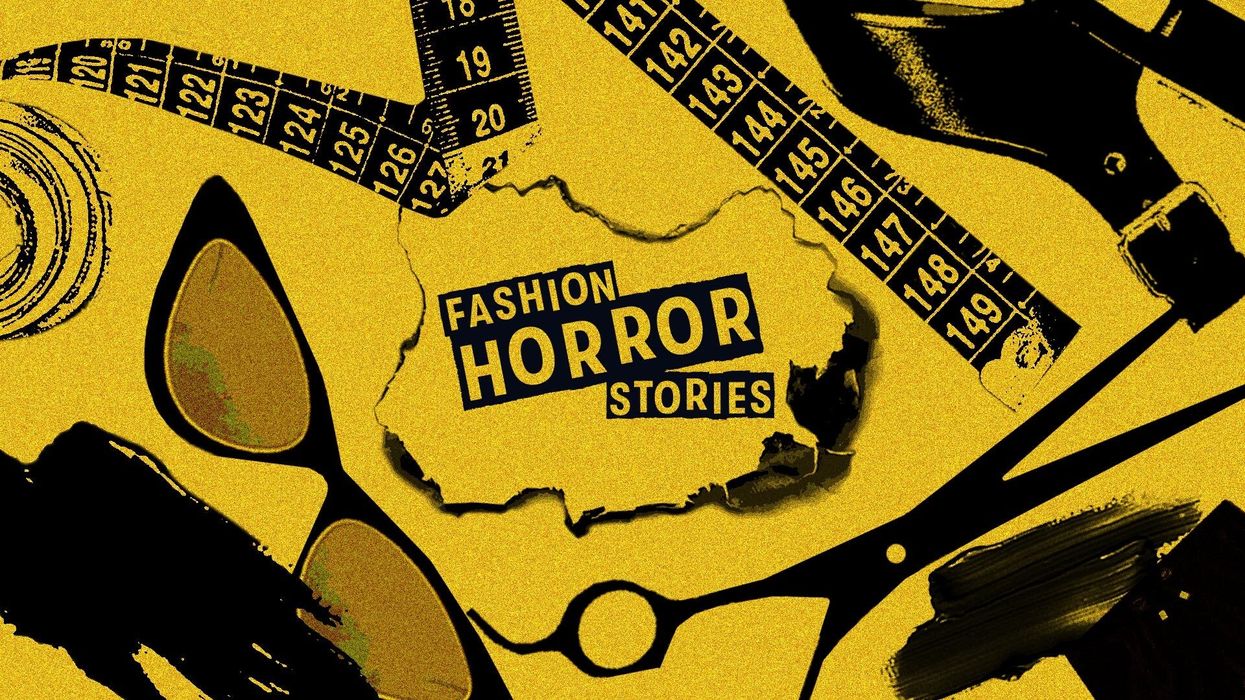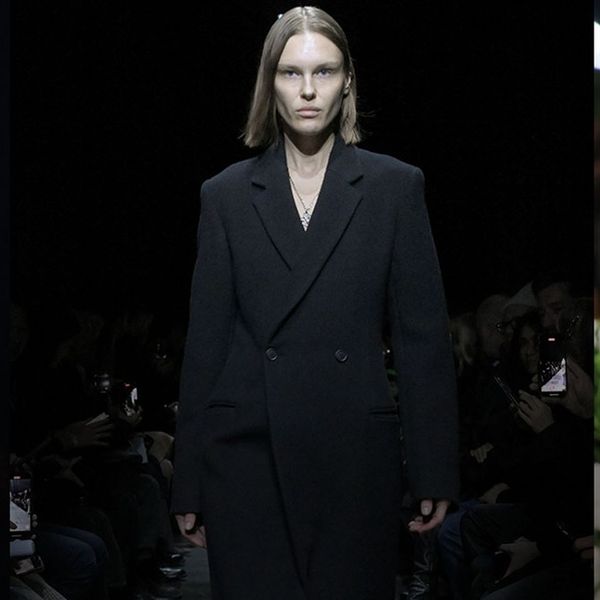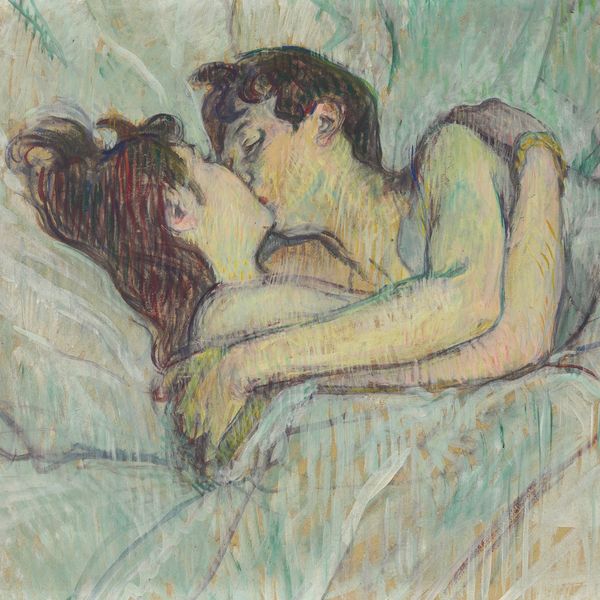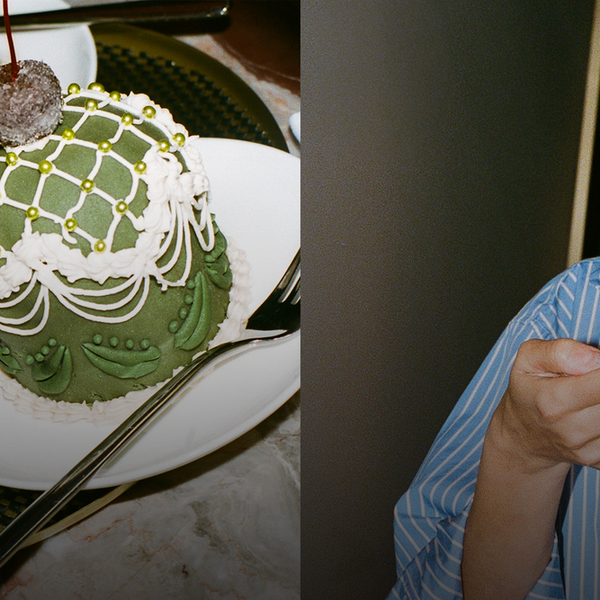He Slept Under His Desk, Dodged Paperweights & Weathered His Boss' Drug-Fueled Tantrums
Gabriel's boss makes Miranda Priestly look like a Sunday school teacher. |

The fashion industry is known for its volatile creatives and unshakable self-seriousness. If you ask anyone who’s worked in fashion or at a magazine if it’s like The Devil Wears Prada, they will likely tell you that’s a G-rated shadow of their lived experience. With our generation’s waning patience with abusive workplaces and megalomaniac bosses, these stories from our collective past are taking on a new light. Often dismissed flippantly as part of “paying our dues,” fashion veterans and current employees alike are re-examining their experiences with newfound clarity. Somehow, even in this relatively progressive era we’ve entered, the fashion industry remains one of the last bastions of unchecked and wildly inappropriate behavior. From former fashion interns to magazine assistants to models, we’re compiling an oral history of fashion workplace experiences in the series Fashion Horror Stories.
In our inaugural segment of Fashion Horror Stories, we sat down with Gabriel*, to discuss his experience moving through the ranks of fashion PR agencies, helping a geriatric dog, and the politics of crying in the bathroom.
How did you land your first job in fashion?
“I moved to New York in 2006. I got my start working a few gigs—part-time at Bloomingdales by day and working the VIP door of a club at night. Having experience as a DJ, I already had friends in the scene, and the key to running [the] door is being good with faces (and having impeccable taste). Working the door connected me with the people that led to my first job with this batty old woman who had been a huge publicist in the '80s, '90s, and early 2000s.”
What did your day-to-day look like?
“Every day at that first job was the same: you get there between 6:30 and 7:30 am. She wouldn’t show up until 10 am, but she had security guards that would tell on us if we weren’t there. We were there to prepare the day for her, which meant everything had to be clean, her breakfast was on her desk, and all the faxes were out of the machine. I was the third assistant, so I got the shittiest jobs. I didn’t have a desk; I sat on a packing box on my laptop. When she came in, she would throw everything on my lap: coat, purse, gym bag, anything in her hands. She would always leave at 5 p.m. for a client dinner and the next day toss a pile of receipts and business cards at me. I was in charge of filing them in one of her 20+ Rolodexes according to a convoluted system. If there was anything she couldn’t find, I would get yelled at.
“On top of that, she put me in charge of her two aging pugs. One of them was deaf, blind, couldn’t walk, and was completely incontinent. So about five or six times a day, I would have to carry the pug outside—in the freezing rain or rancid summer heat—and massage its belly to make it go to the bathroom. We worked about 60 hours a week, and for the first few months, we worked for free. I made a lot more money working door gigs at night and when we finally got paid it was barely 26K a year. She was a lot to handle but she did give me a piece of advice I never forgot. She said, ‘The most important client you’re ever going to do PR for is yourself.’ If nobody knows what you’re doing and you aren’t singing your own praises, no one else will and you have no value.”
After that first job, where did it lead you in the fashion industry?
“Through babysitting my first boss’s fashion clients, I ended up connecting with a man who ran a fashion PR agency. It was a renowned agency at the time, privately owned and competitive with the biggest in the industry. I started as an account manager probably making around 37K a year. I was working directly under the founder and this guy was a fucking nightmare. He had a raging cocaine problem. He used to show up erratically any time between 5 am and noon in a fit of rage, sweating profusely, coke on his face, shirt untucked and totally slovenly. The irony of it all was he enforced a very strict dress code for the rest of us. You had to wear all black. The women had to wear heels that were a minimum of four inches tall. You had to have your hair blown out or in a slick, high ponytail. If you didn’t follow these rules, you would be screamed at, sent home, or maybe even fired. We all sat in an arrangement we dubbed ‘the pit.’ All the directors and VPs had desks, but the rest of us had to sit side by side like caged animals in the center of the room. We were elbow to elbow at desktop computers—so close you often hit your mouse into your neighbor’s keyboard. We worked on 18 to 27 shows a season, which meant that four days before the show, things would get so intense that most people would sleep under their desks from 2 am to 5:30 am before the boss came in. If you were lucky, you could curl up in the corner of the sample closet, which was the nicest part of the office.”
What was your relationship like with your boss at that agency?
“This nightmare boss adopted me as somewhat of a protegé, although I never felt protected. In his private office, he had me sit behind a partition so he could scream at me whenever he wanted. When he screamed, you would have to run in front of his desk and stand at attention like a soldier. Much like Miranda Priestly, he needed his assistant to bring him every meal and it had to be plated on china or he wouldn’t eat it. When he got really mad, he would usually grab whatever was closest to him—oftentimes that was his lunch—and chuck it at you (china and all). You would have to duck or dodge and it would smash against the wall behind you. I once got hit in the stomach with a paperweight. I also got cuts on my hands leaning up against a piece of furniture and slicing my hand open on a shard of broken china. When his tantrum passed, you were expected to come back in quietly and clean it all up. Every time he was really, really nasty to me, I would randomly receive a messenger to my house with a $3,000 Prada suit or something like that. I still have that suit.
What was your relationship to your colleagues in an environment like that?
“In that office, you weren’t allowed to show any emotion. You couldn’t be happy, you couldn’t laugh, and crying was especially forbidden—especially if he was around, he hated it when you cried. If he caught a tear, he would make you stand up and berate you in front of everyone about how awful you were and how you were never going to succeed. If you felt like you were about to cry you had to run to the bathroom and cry quietly in a stall—’quietly,’ because if a VP heard you crying, they would tell on you. Most of us from ‘the pit’ would go to the bathroom down a floor if we had to cry audibly. Since it was such a disgusting bathroom, none of the VPs would be there.”
When did you reach your breaking point?
“Once a week, we all had to gather in the conference room for an update meeting. Everyone that was a director or above was seated, the rest of us had to stand around the perimeter with a notebook in our hands—if you didn’t have a notebook, the boss would assume you weren’t working. At one update meeting, I was excited to share that I’d gotten an interior designer—the same one who happened to be working on my boss’s house upstate—a fourteen-page spread and a cover in an international design publication. When I shared this, he stood up with an expression of pure fury, sweat dripping down his face. He walks up to me and asks, ‘Are you stupid?’ I just froze. He said, ‘This isn’t a rhetorical question. Are you stupid?’ I sheepishly said, ‘No.’ Then he flew off the handle—’Who the fuck do you think you are? Who gives a fuck about a regional magazine? You’re a failure. You failed. Why the fuck did I hire you? You fucking loser. You’re fucking stupid. Say it. Say that you’re stupid.’ At that point, I was doing anything I could not to cry. I said, ‘I’m stupid.’ I was digging my fingernails into my palm and sweating through the $3,000 suit he’d given me the day before for hitting me in the stomach with a paperweight. Once it was over I ran downstairs to the disgusting bathroom and broke down sobbing.”
How did you end up leaving that job? Looking back on it now, what did you learn from that experience?
“I was there for nearly four years before I was recruited to another job. If you asked me why I didn’t leave earlier, it’s because I honestly didn’t think I could do any better. I thought I was worthless. They make you believe no one would ever hire you, and if you crossed them they would blacklist you from any other job in the city. And after years, I started to believe that I was truly stupid. It took me nearly two decades, and working on campaigns for some of the world’s most globally recognizable brands, to get rid of the sense of worthlessness that he instilled. As a person who is gay and brown, I’ve had to work ten times as hard in this industry and against a society that already makes me feel undervalued and out of place. Today, I’ve turned a page and I now believe in myself and the quality of my work.
“Thankfully, following the Vogue intern revolt around the 2010s, there are a lot more protections in place at larger companies, but my experience changed the way I approach managing my employees. Throughout the course of these nearly two decades, I’ve formed a list of things I will never do to people I manage. I do my best to be a mentor and facilitate growth. The one thing I mirror from that first job is my unending requirement that people strive for excellence. You don’t need to be excellent, but you should always strive for it. My strengths have been born out of the trials and tribulations I face in this industry and I’m grateful that I’ve come to a place where I am not willing to accept mistreatment. And I am also not willing to accept mediocrity.”




